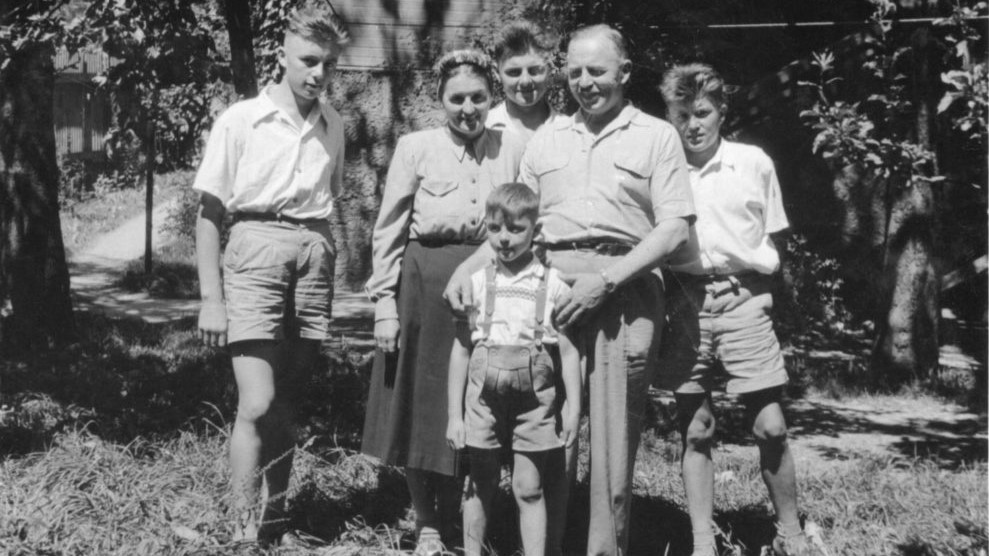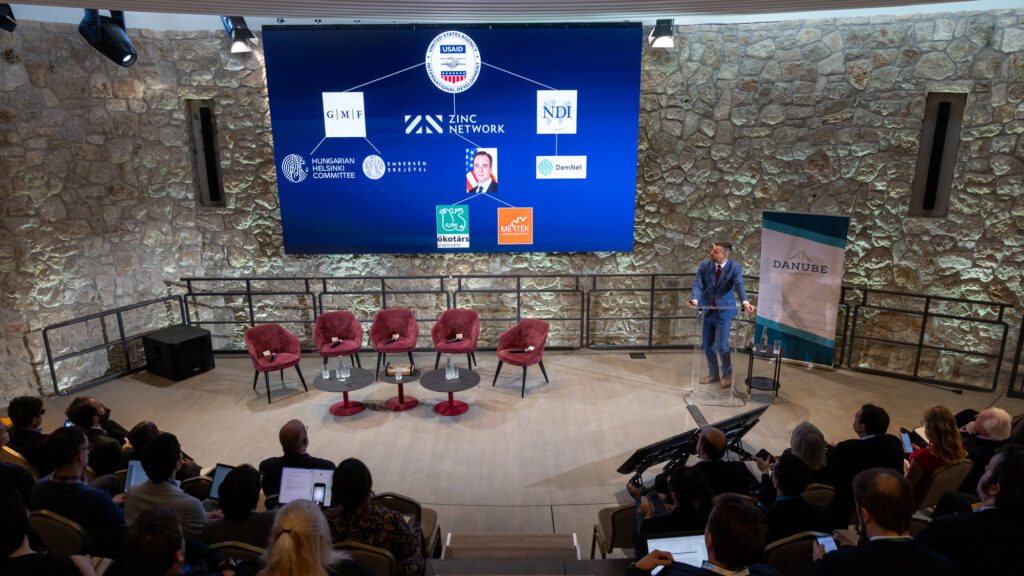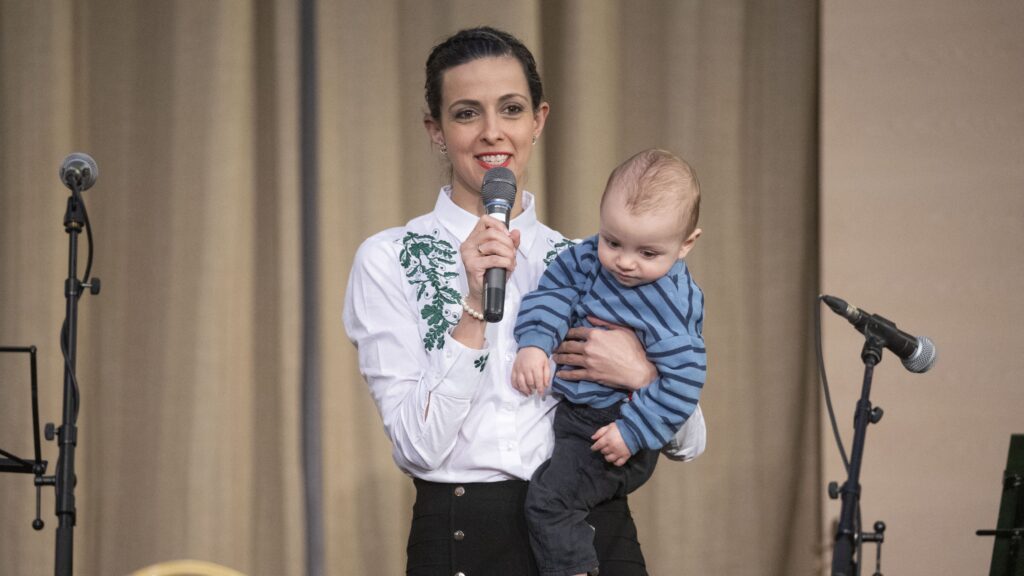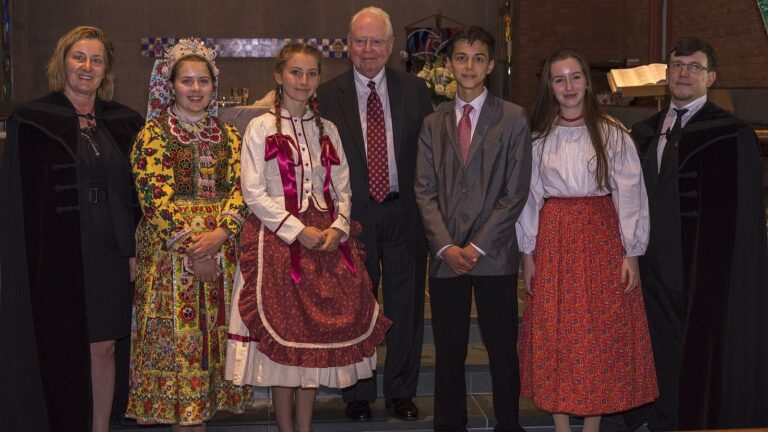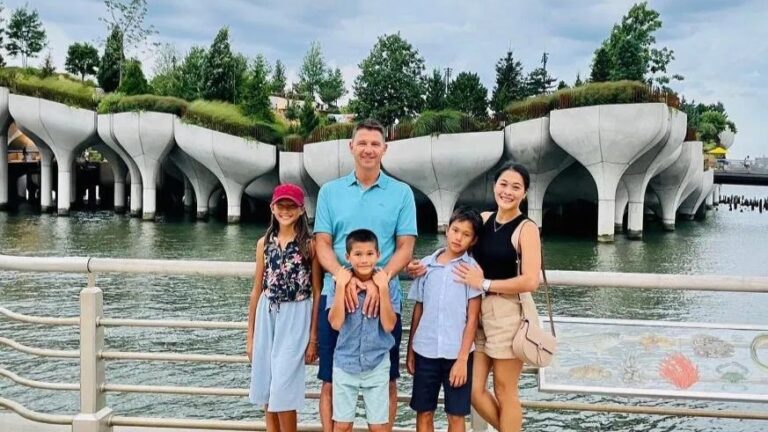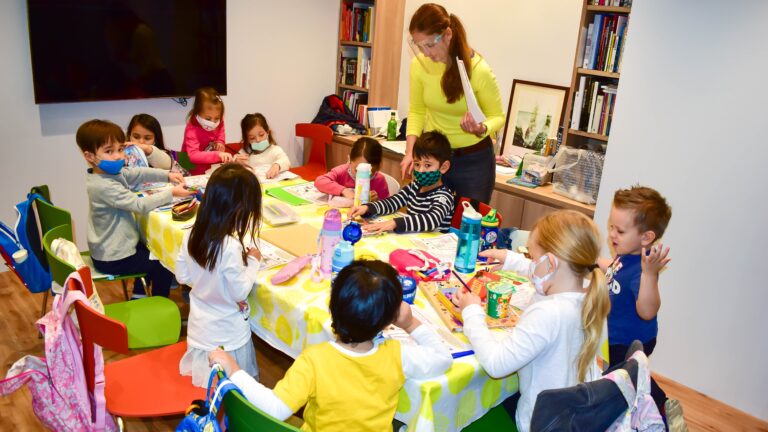This is an abridged version of the original article, published online on 777blog on 10 February 2023.
I first met László Hajdú-Németh, ‘Laci bácsi’, when my acquaintances from Passaic, New Jersey, suggested attending the ‘Christmas for Everyone’ Vigil concert at St. Ladislaus Church in New Brunswick, New Jersey. Laci bácsi is the heart and soul of this annual musical event, which celebrated its 30th anniversary in 2022. We didn’t have the opportunity to talk then, but in January, he invited me to his home in Somerset, New Jersey, where, beneath paintings of his parents and grandfather, he spoke for hours about his large family, the Hungarian Catholic church, and the local Hungarian communities.
***
A Family’s Journey and Deep-Rooted Hungarian Identity
In preparing for the interview, I learned that in 1953, at the age of eight, László fled from Nagylózs, a village near Sopron, Hungary, with his mother and three older brothers, following his father, who had been forced to emigrate in 1947 from Communist Hungary as a member of Parliament for the Smallholders’ Party. After spending two years in Germany, they arrived in New Brunswick, New Jersey. He earned his degree in economics at the Catholic University of Leuven, Belgium, and returned to America in 1969, where he married a Hungarian girl, Irén Keresztes. They have four children and ten grandchildren. Their home is filled with charming Christmas decorations, showcasing Irén’s craftsmanship—following Hungarian tradition, they decorate for Christmas Eve and keep the decorations up until 2 February. Since a large family photo album hangs in the hallway, that’s where we began our conversation. All four of their children married Hungarian spouses—a rare and challenging feat in America. However, their deep involvement in Hungarian communities significantly eased the process of finding Hungarian partners. In fact, as a book he gifted me attests, one of his grandchildren once jokingly remarked: ‘Grandpa would definitely have something to say if it weren’t this way…’ Upon arriving, I was given three gifts: an album by Sarjú Banda, a folk music band founded by his grandchildren living in Hungary, featuring familiar faces from the renowned Hungarian folk music and dance competition Fölszállott a páva, including the young Lacika, named after his grandfather; a biography titled Fateful Years, documenting his father’s escape and a commemorative album about his father, published in 2022 on the occasion of unveiling his father’s memorial plaque in Nagylózs. His father’s memory is palpably present in their home—and, as I soon realize, deeply embedded in the Hajdú-Németh family’s life.
A Life Interwoven with Community and Tradition
I’m touched by the warm welcome, though Laci bácsi needs no prompting to share his stories. Soon, however, he is the one to overcome with emotion. When his voice falters, or his eyes well up with tears, we pause in silence for a while…I can only present a brief excerpt of our conversation in writing, hoping to capture its intimate and heartfelt essence. ‘As you are already familiar with the adventurous story of our escape from Hungary, I’ll begin from 1963, when I went to Belgium, thanks to Jesuit Father István Muzslay, who was then the director and benefactor of the Cardinal Mindszenty Collegium Hungaricum. Among the Hungarian university students, I already knew two from the refugee camps in Germany: Ákos Barcsay and Péter Kemenes. We formed lifelong friendships with them and their families—those were some of the best years of my life. When I returned to America and to the Hungarian community at St. Ladislaus Church in New Brunswick, New Jersey, it felt as if nothing had changed, as our family had always been very active in community life,’ he started.
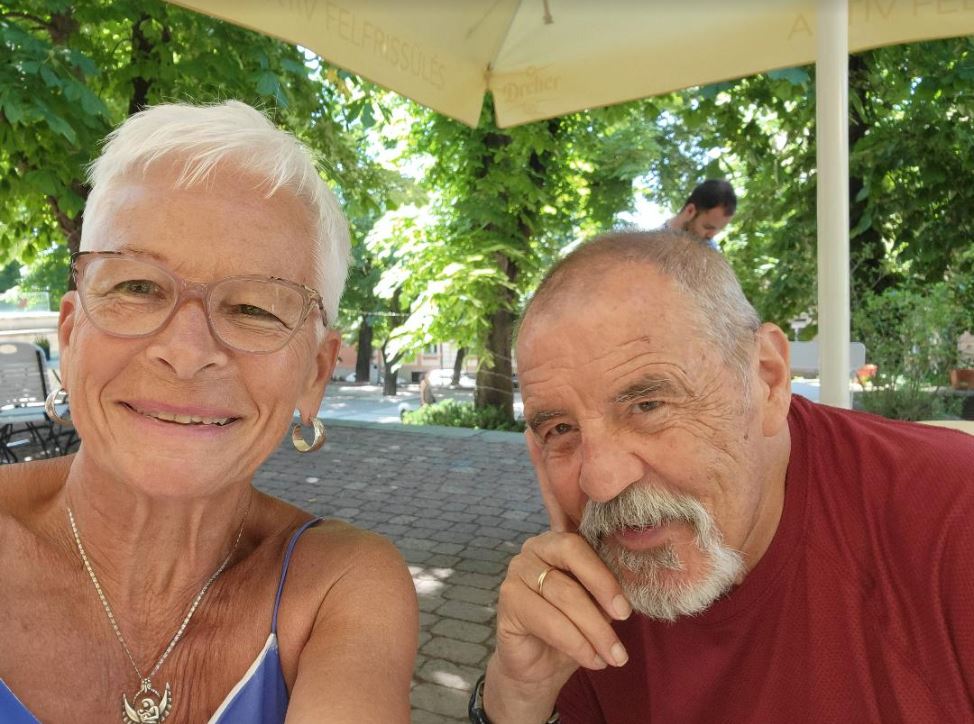
His father, as a founding member of the Hungarian American Republican Alliance and a tireless advocate for Hungarian interests—especially the liberation from Communist oppression—played a crucial role in shaping the Hungarian community in New Jersey and beyond. As a young adult, László soon became involved in the local Hungarian scout troop as a member of the parents’ support organization responsible for fundraising and event planning. He met his future wife, Irén Keresztes from Passaic, New Jersey, at the Pöttyös (Dotted) Ball—this year marks their 50th wedding anniversary. Their children have also been actively involved in scouting, while the parents cooked in scout camps, further strengthening their ties with other Hungarian families. Three of their children met their future spouses at the scouts’ Jubi Camp in Fillmore, upstate New York, while their oldest son, László, found his wife through folk dance and music.
Hungarian folk dance has a long-standing tradition in New Brunswick, where three folk dance groups continue to operate. In the 1970s, Laci bácsi himself danced and remained active even after his children were born, later taking over leadership of the Regös group. (‘Regös’ refers to the older scouts who preserve Hungarian folk traditions, primarily through dance. This tradition has faded in many Hungarian scout troops within North America, but it continues to thrive in Cleveland, Ohio.) When the mayor of their sister city, Debrecen, Hungary, invited them to the famous Flower Carnival, they merged the two existing dance groups—the Regös scouts and that of the Hungarian American Athletic Club (HAAC)—forming the Csűrdöngölő Dance Group. Zoltán Zsuráfszky, director of the Hungarian National Dance Ensemble, personally came to train them for their performance in Hungary. After Debrecen, they also performed in the Buda Castle in Budapest. Later, László Jr. took over leadership of the group, while Laci bácsi focused more on organizing. Though the group has aged, they continue receiving young dancers from the Mákvirág children’s group. Szilvafa is a folk dance group that is available for middle-aged and older dancers.
Several of Laci bácsi’s grandchildren are scouts—his younger son, Gergely, still regularly helps with scout activities—and many participate in folk dancing—especially those now living in Hungary, whose album I received as a gift. ‘All ten of my grandchildren speak, read, and write Hungarian. However, the English language is becoming increasingly dominant, even within our families. My children and their Hungarian spouses often speak to each other in English. I’m very sensitive to this—once, I even jokingly told them in frustration that I wanted my gift back. “What gift?” they asked. “The Hungarian culture I gave you,” I answered sadly. I cannot understand why someone would give up something so valuable. If they lose this, what will they draw from? In America, most immigrants have no national self-awareness, because most people didn’t consider it important to preserve their home culture. We, too, are American to some extent, and we respect this country for the opportunities it has given us—opportunities we’d never have had back home. I saw this with my own eyes when I returned to Hungary with my mother in the 60s. We didn’t have much back then, but we still lived far better than those in Hungary. But today, we have become so consumed by the daily struggle to create wealth that we are losing sight of what truly matters,’ said Laci bácsi with resignation. When I asked him to elaborate, he responded: ‘More than 100 children attend the weekend Hungarian school. Many also participate in folk dance and scouting. Yet our St. Ladislaus Church is empty…and so is the Hungarian Reformed Church…If only half of these families attended our services and the other half attended the Reformed services, we’d already be in a better position. Our churches and institutions would have a more secure future…’

When asked about his personal faith, Laci bácsi suddenly fell silent and became emotional. ‘I believe we absorb faith emotionally as children. I’ve often wondered why I am who I am and why faith is so important to me. For me, it’s intertwined with singing and my childhood experiences—Christmas and Easter ceremonies, the Corpus Christi procession through the village, and the noon bell, when fieldwork would stop, and people would say the Angel of the Lord. Even here in America, keeping these traditions and actively taking part in the preparation works remains important to us.’ His parents also set many good examples, which helped him maintain his faith and religious life. He doesn’t recall ever feeling an overwhelming urge to go to church; it was simply natural for him to be there, to feel at home there. And that is still the case today, as he explained. ‘The lyrics of our Hungarian church hymns still resonate with me much more than those in English. I see English sermons differently, too, perhaps because I grew up listening to deeply religious Hungarian priests. Father Imre Juhász’s sermons are excellent, as were those of Father Kapisztrán—even though he conducted mass in English, he still conveyed profound philosophical and theological knowledge. In Belgium, Father Muzslai provided continuity for me, and here, we lived close to the church, so it was very natural to go to litanies, to sing, to serve at the altar. All of this gave me a strong foundation for who I am today. Of course, I’ve stumbled many times in life, but I always had something or someone to hold on to…Naturally, Irén played a huge role in this. In 2023, we celebrated our 50th wedding anniversary, and I owe her so much—she’s been my lifelong companion,’ explained Laci bácsi with affection.
The Vigil Concert — A 30-Year-Old Tradition
When asked about the Vigil Concert, which has now been held for 30 years, Laci bácsi responds with a wistful smile: ‘It all started when I noticed that the church was emptying, that parents weren’t bringing their children who were the same age as mine. As I mentioned, my faith is deeply emotional. Christmas has always meant a lot to me—it offers a spiritual experience and creates a warm family atmosphere. So, I thought maybe I could awaken that same feeling in young people and bring them back to church. As a Regös leader, it was easy for me to establish the Vigil Concert—I simply started preparing them…’ Laci bácsi not only organized the event, taught the scouts, but also made flyers and handed them personally out to every Hungarian organization, invited everyone from the community, and asked them to bring others as well. The event gradually gained popularity; over time, people began to expect it and attended without persuasion.
At first, they only sang and recited poetry, then introduced a nativity play segment (pásztorjáték), and later incorporated Scripture readings as well. For over ten years now, István Bereczki, the current boy scout leader, has been reading out, providing a framework for the event, which Laci bácsi organizes around three themes: revelation (Advent hymns), birth (Songs about the Virgin Mary), and joy (Christmas hymns). Even though it is ‘just’ a once-a-year event, it requires a tremendous amount of work. ‘I’m not a trained musician, just as I’m not a trained folk dancer, but I can read sheet music. We didn’t have classical sopranos, so I had to find someone who could transpose the hymns into four-part harmonies. Then I had to learn and teach them. We usually start rehearsals as early as September. At one point, I even managed to gather a 20-member classical orchestra. When my son Laci and his family still lived here, I reached out to his children’s violin teacher. Her husband played the cello, and then one musician brought another,’ he explained the background details.
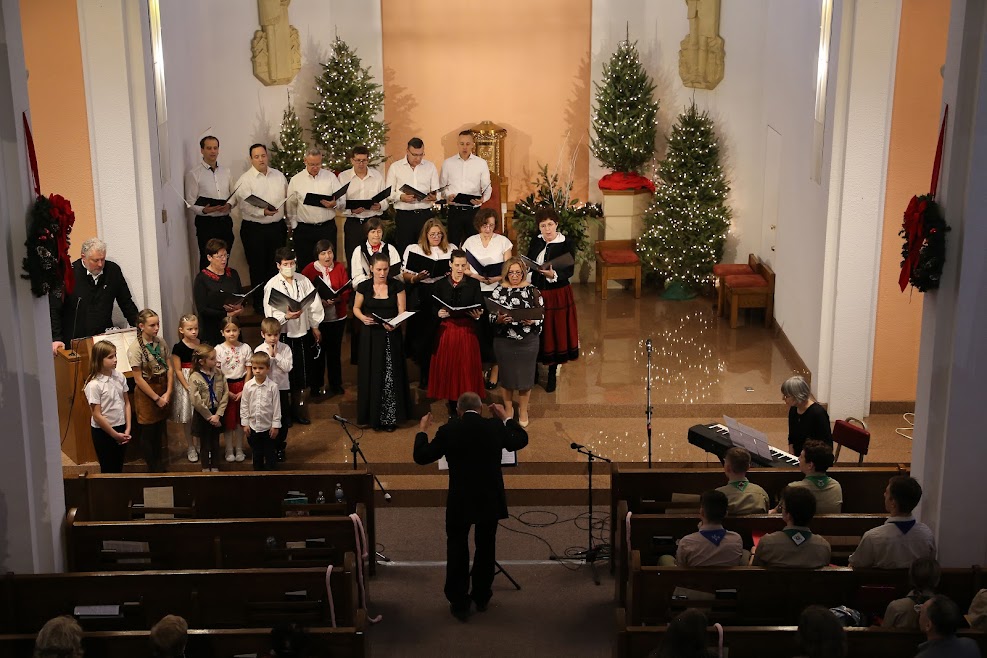
In recent years, folk music has also become part of the event. ‘I listen to a lot of music and have a huge collection of CDs—that’s where the idea for including folk music came from. At the most recent Vigil Concert, we even formed a folk music ensemble with teenagers.’ He pauses for a moment, then adds with a smile: ‘There will never be a year without a performance, but I’m getting tired now. I’d gladly pass it on and just sing—but for now, there’s no one to take it over. That’s why, more and more, I turn to our old repertoire—we already have 60 hymns. If we lose members and need to train new ones, we dust off the old songs,’ shared Laci bácsi in more detail. Unfortunately, the church no longer has a permanent choir, so there are no other musical events throughout the year except for the Passion Play at Easter, though even that is becoming harder to perform. ‘As long as we are here, we will sing. But there are fewer and fewer of us who can do so,’ he added sadly. When I asked what else he does, it turns out he is responsible for virtually everything related to church music—organizing, arranging, and even finding organists and cantors when needed. ‘This is my heart’s calling,’ he said simply. When I ask about the future of the Hungarian community, he sighs deeply. ‘During the annual Hungarian Festival, the church is full of people, but since the COVID pandemic, attendance at Hungarian events has significantly declined. At least, I recognize fewer and fewer familiar faces—even though I’ve lived here for 55 years. The problem is that we no longer have a shared goal. After 56, we did have that. Oppression and economic insecurity brought people together. They needed a Hungarian community, where those who had arrived earlier helped those who came later. When Cardinal Mindszenty visited us in 1973, there was enormous mobilization—everyone got involved. But today, that spirit has faded. And yet, faith is spiritual nourishment—something to hold on to when times are tough. I say this from experience,’ Laci bácsi contemplated. Finally, when asked about his personal goals, he responded: ‘Nowadays, when I go back to Hungary, my first stop is always the cemetery. I’m working on organizing my family’s vast heritage, a task I’ve already begun but still has much left to process. For example, I want to find out why my last name is Hajdú-Németh. Some relatives are Hajdú, others Németh, but no one knows why. I also want to uncover all of our family history and leave it behind for my children,’ he replied, his eyes welling up with tears. Then, quickly pulling himself together, he cheerfully ushered me into the kitchen to have a fine lunch together prepared by her wife during our lengthy conversation.
Related articles:

